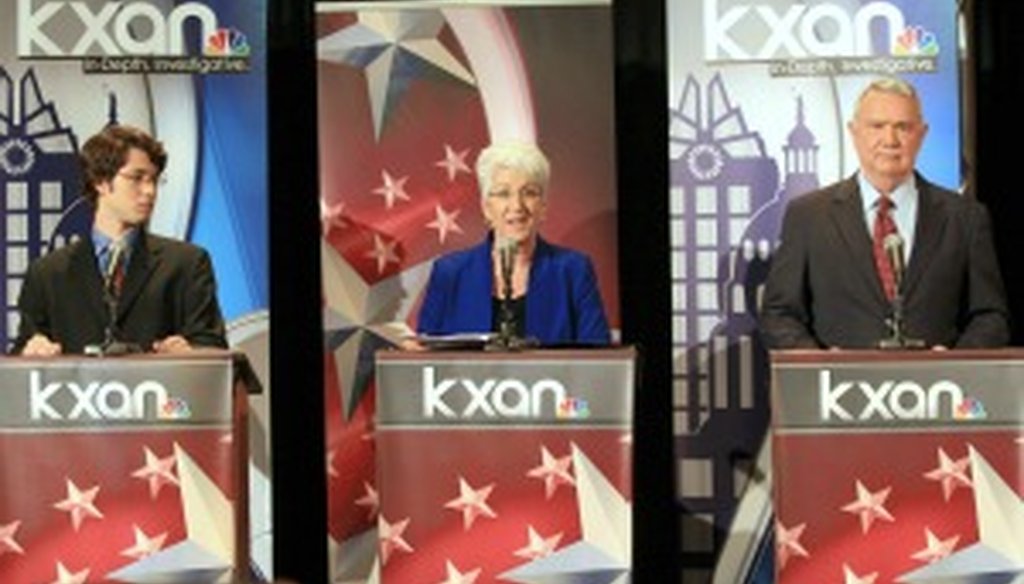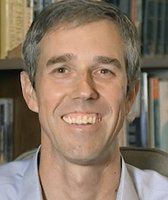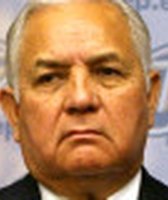Get PolitiFact in your inbox.

Austin mayoral candidates Clay Dafoe, Brigid Shea and Lee Leffingwell debate April 16, 2012. Jay Janner photo/Austin American-Statesman
Did Lee Leffingwell, who won election to a second three-year term as mayor this weekend, vote to toll lanes on MoPac?
Are there (still) no Austin City Council members living in South Austin or north of 45th Street?
Those are just two of more than a half dozen questions explored in recent Austin-centric Truth-O-Meter articles prepared in advance of Saturday's city elections in which Leffingwell was joined in victory by three fellow City Council members -- Mike Martinez, Sheryl Cole and Bill Spelman.
Leffingwell, it turns out, has voted a few times for tolling a lane in each direction on MoPac, potentially relieving congestion. We rated mayoral challenger Brigid Shea's claim to this effect as True.
Council hopeful Shaun Ireland is (still) correct that no City Council lives in South Austin. But if 45th Street were somehow extended east and west, Leffingwell and Martinez would narrowly live north of that line. We rated Ireland's claim Mostly True.
Other claims proved more shaky.
The mayor said Austin has the lowest tax rates of the state’s biggest five cities.
Shea said the mayor raised taxes 20 percent in three years.
Martinez said it’s always grown more expensive to live in Austin.
And another mayoral hopeful said bus riders subsidize the "expensive, romanticized" Leander-to-Austin train.
Leffingwell is correct that Austin’s 2011 property tax rate was the lowest, by far, of the rates in the state’s biggest cities. Yet we rated his statement Half True because rates alone are not the only, or even best, indicator of how much residents have been socked by property taxes. Valuations and exemptions matter, too. Comparing each city’s average-value home in 2011, for instance, Austin would have extracted the second-highest tax payment. Without this context, Leffingwell’s rate comparison is missing a gear.
Shea, similarly, is right that Austin's taxes increased 20 percent with Leffingwell as mayor. However, her claim lacked critical context; no mayor raises taxes, or sets tax rates, on his or her own. Such decisions are made by the full City Council with each member, including the mayor, having one vote. We rate Shea's claim Half True.
Martinez, seeking re-election to the council, told KUT, 90.5 FM: "Over the history of Austin, it’s always gotten more expensive."
Martinez did not have detailed backup for his claim.
And in some ways, Austin has grown more expensive of late.
But rents dipped in some years. And the area’s average annual pay outpaced inflation over a recent decade.
Also, it's reasonable to speculate that periods of economic difficulty through history included decreases in Austin's cost of living. His statement carries a nowadays’ ring of truth, but the "always" element disregards times when costs dropped. We rated Martinez’s statement Mostly False.
Mayoral hopeful Clay Dafoe urged less spending on trains and more money for bus service at an April 16 debate, adding: "Basically, what we’re having is people riding a bus, subsidizing this expensive, romanticized train that really doesn’t qualify or fit the needs of Austin."
That’s not so.
Most of the budget for Capital Metro’s buses and commuter train comes from a local sales tax.
If anybody’s "subsidizing" the trains, then, it’s Austin-area shoppers.
Hear a claim that bears review? Write us at [email protected] . All aboard!
Our Sources
See Truth-O-Meter articles.







































